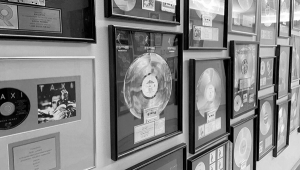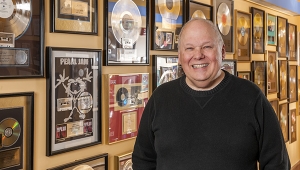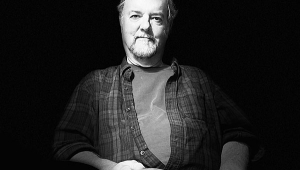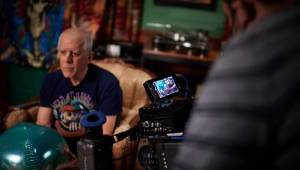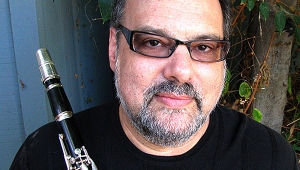| Columns Retired Columns & Blogs |
35 Years and Just Getting Started: The J. Gordon Holt Interview Page 9
Stone: This brings us to where high-fidelity might go in the future. It seems as if it's dividing into two camps: surround-sound or Home Theater, and two-channel stereo.
Holt: That's not going to continue. When electrical recording came along, a lot of record collectors insisted that electrical recordings were no good because they didn't sound musical. The same thing happened again when stereo came along; a lot of people fought that, too, for years and years, and eventually they changed their minds or died off and their opinions didn't matter any more. I mean, try to find someone today who'll argue that mono is a better way of listening than stereo. Maybe for certain purposes it is, but certainly not for realism.
Holt: That's not going to continue. When electrical recording came along, a lot of record collectors insisted that electrical recordings were no good because they didn't sound musical. The same thing happened again when stereo came along; a lot of people fought that, too, for years and years, and eventually they changed their minds or died off and their opinions didn't matter any more. I mean, try to find someone today who'll argue that mono is a better way of listening than stereo. Maybe for certain purposes it is, but certainly not for realism.
The same thing's going to happen with surround-sound. And surround-sound is a great way for dealers and manufacturers to sell more equipment! They'll love it.
To me, the biggest threat to what we call high-end audio right now is the idea that realism doesn't count at all---that the only thing that counts is, does it move you musically? Does it give you an emotional, a musical, experience? Of course that's important, but so is accuracy.
Stone: The dichotomy between the perfect and the real is one of the problems in high-end stereo systems: accuracy vs idealized bel canto.
Holt: Accuracy vs musicality. You can't argue it. I'm certainly not going to sit here and say, "No, you can't buy this system because it doesn't sound real, even though it makes you love the music." I mean, if it does that to you, that's basically what it's about to begin with. A home stereo system, or home music system, is about you. If the way it reproduces music leaves you unmoved, then it doesn't matter how "accurate" it may be, it's not doing it. But it seems to me that's only half of it.
The other half requires combining that with accuracy. It can be done. I mean, do you know of anyone who'll come back from a live concert and say the sound was unmusical?
Stone: But again, it sounds like there's still a dichotomy between musicality and accuracy. It's like the dichotomy between what a professional listener wants---accuracy---vs what a recreational listener wants: musicality.
Holt: You're right. There is a dichotomy there, but there doesn't need to be. Well, as I said earlier, the musicality end of it is a slippery slope---once you say there's no standard for what something should sound like, then anything goes. As I said before, many years ago when I was working for another magazine, the publisher once told me, "I don't care if you play the damn thing with your fingernail, if it sounds good."
Stone: But at that point, there's no need for the High End.
Holt: That's right. Many, many of the things high-end people want are things that you do hear in live music. Things like detail, resolution, imaging, soundstaging, and so forth. But when it comes to spectral balance, which is very often a thing that's the first to go in a "musical" system, no one seems to agree.
Stone: We talked a little about the emphasis on soundstaging vs harmonic accuracy, and the tendency of many reviewers and many people in the high-end industry to make soundstaging, not harmonic accuracy, the raison d'être. And how that leads to systems that are not accurate.
Holt: I think one of the reasons for this is that fewer and fewer people have the inclination to attend enough live concerts to know what realism actually sounds like. I find this trend more than a little depressing. I've read that some concertgoers are starting to be bothered by the fact that what they're hearing live doesn't sound enough like what they hear at home from their stereos, and they want the concert management to do something about it.
Stone: The cart is beginning to pull the horse.
Holt: Yeah. And a number of symphony orchestras are responding---adding electronic enhancements or spot-miking soloists. Some are even using artificial reverb because of supposed deficiencies in their halls. I mean, God knows, the hall where we record could use a little bit more reverb...but then it wouldn't sound like that orchestra in that hall.
But the ear is a lot more forgiving of the quality of reverb than it is of the direct sound from instruments. You can get away with a lot of veiling, distortion, and stuff like that in the surround channels if they're just reproducing reverb. You don't even notice it, let alone fret about it. You've probably noticed on a couple of occasions when we were recording the Boulder Philharmonic and they used a mike and their PA loudspeakers to amplify the soloists.
Stone: With Pepe Romero's guitar.
Holt: The sound that we got from the solo instrument was considerably enhanced by that additional hall sound coming back. There was a lot more bloom from the PA system. Now there was an example of artificial reverb that improved the recording and was not at all detrimental to it. So I'm not saying that, for instance, doing good things with reverb is bad. But again, the problem is that that kind of thing is usually overdone; and second, it's just a short step between that and starting to amplify one group of instruments, like the woodwinds, and maybe another group, until the whole orchestra is what you might hear if you listen to a multimiked recording in the hall. Then what's the point of going out to hear it live? I will refuse to pay money to hear a live orchestra amplified when I can hear it amplified at home for free.
Stone: Any other new trends that worry you?
Holt: A very worrisome thing is what has been built into the new DVDs---the regional copy protection. Right now they're using it to control what countries a particular movie can be shown in at a particular time, so it can't be released on DVD before it's debuted there in theaters. What is there to prevent them from changing this code just a little so that you can only view a movie for a period of a year, after which you must pay a renewal fee to be able to watch it for another year?
Stone: So you see the trend as being not owning or collecting software, but renting it on a pay-per-listen or pay-per-view basis?
Holt: The precedent has been set now in computer software. Basically, when you buy a computer program, you don't own it, you own the right to use it. If you don't want to use it any more, it's illegal for you to sell it to someone else.
Stone: Well, renting software will make for less clutter in people's homes.
Holt: Yeah. I think that, eventually, holding a real book in your hand is going to be something limited to just a few wealthy people.
Stone: But some might argue that the need to collect is a basic human drive---that you can go back to primitive peoples and find that the collecting urge has been around as long as Homo sapiens.
Holt: I'm sure this is true. But the ability to collect things---I mean, collecting things is going to become so expensive that only institutions or wealthy individuals are going to be able to indulge in it. The rest of us will have our bread and circuses, but we won't have access to "the finer things." And we'll see a nationwide campaign to convince us that we really shouldn't want them anyway, so we won't feel too bad about it.
Stone: That's grim.
Holt: One of the good things that will come from it is that there will be less use of natural resources. Which is needed. I mean, when one person or a million can be equally served by one recording of a book online, that will save an awful lot of trees. And can you imagine, for instance, an 8½" by 5½" back-lit panel that would weigh maybe a few ounces, and would have a couple of knobs on it, and probably a limp, hardwired connection to a national network. You could take it anywhere you wanted, plug it in, sit down, call up any book that you wanted from a national database, charge the user fee to your account, and there it is. You advance or go backward by pages, either by keying in a number or by pressing a Page key. You wouldn't own the book, and you couldn't touch a leather binding or smell the ink, but you could read any book any time you wanted to.
Stone: Makes sense.
Holt: Is that encouraging?
Stone: I don't know. Being very much a collector kind of person, it's sort of discouraging. It does mean that natural resources would stretch to the vast quantities of people on earth who need the resources.
Holt: Well, you know, another upside to that would be that people wouldn't accumulate vast collections of stuff that had to be carted with them every time they moved. And people are moving more and more often. Also, they could live in smaller houses because they wouldn't have to store all that stuff.
Stone: True.
Holt: I think it's scary! [laughter] But anyway, that's one of my visions of the future. I don't think I'd like it very much.
Stone: No, but then you probably won't have to be around to deal with it.
Holt: I certainly won't be around to deal with it.
A letter on the subject of J. Gordon's past appeared in the April 1996 issue of Stereophile:
Gordon at Stereo Review
Editor:
In the February Stereophile (p.3), you again mention J. Gordon Holt's early days at High Fidelity before he founded his "underground" journal. Nobody ever mentions his tenure at (horrors) Hi Fi/Stereo Review.
I gleefully enclose some photocopies of his erstwhile 1950s column "Sound and the Query." With its Faulknerian/Shakespearean echoes ("...a tale told by an idiot, full of sound and fury, signifying nothing"), it sounds like a description of a tweako article in some present-day journals.
---Chuck Crawford St. Albans, WV
- Log in or register to post comments

